Introduction
Can Rabbits eat snap peas? Let’s find out.
Picture this: a plump, crunchy, and oh-so-delicious snap pea, packed with nutrients that can make your rabbit’s taste buds go wild! But the question on everyone’s mind is, are snap peas safe and beneficial for our furry friends?
We’ll explore the incredible benefits of snap peas, uncover their nutritional value, and even dive into some mouthwatering recipes that will have your rabbit doing bunny backflips of joy. And that’s not all!
Are snap peas safe for baby bunnies? Is there such a thing as too many snap peas?
So, whether you’re a seasoned rabbit owner or just starting on this fuzzy adventure, get ready to hop into a world of snap peas and bunnies like you’ve never seen before. We’re going to explore, educate, and satisfy the curiosity that’s been nibbling away at your brain.
Let’s give those bunnies a treat they’ll never forget!
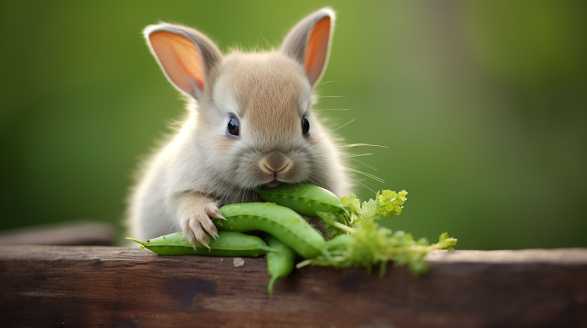
Key Takeaways
- Snap peas are a safe and nutritious addition to a rabbit’s diet, but should be given in moderation.
- They are a good source of fiber, vitamins A, B6, and C, and minerals like iron and potassium.
- Snap pea pods are safe for rabbits to eat and can provide dental stimulation.
- It’s important to introduce snap peas gradually and monitor your rabbit’s reaction.
- Snap pea allergies are possible in rabbits, so be cautious and consult a vet if needed.
- Snap pea treats can be made at home using a simple recipe.
- Other safe vegetables for rabbits include bok choy, celery, cucumber, kale, and carrots.
- The nutritional benefits of snap peas and snow peas are similar, providing fiber, hydration, and dental health benefits.
- Both snap peas and snow peas should be given in moderation to avoid digestive issues.
- A balanced diet that includes hay and leafy greens is essential for a rabbit’s overall health.
Are Snap Peas a Good Source of Fiber for Rabbits?
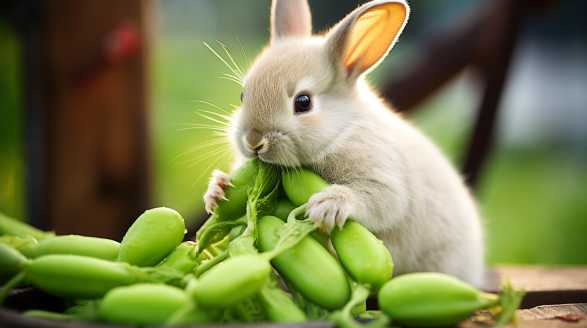
When it comes to providing our beloved rabbits with a healthy and balanced diet, fiber is a crucial component. As a responsible rabbit owner, I always strive to ensure my furry friends get the nutrients they need.
Naturally, countless questions flooded my mind: Are snap peas safe for rabbits? Can they provide the necessary fiber?
The Fiber Needs of Rabbits
Before we explore snap peas as a potential source of fiber, let’s first understand the dietary requirements of rabbits. Rabbits are herbivores known for their unique digestive system.
Insufficient fiber can lead to various health issues, including gastrointestinal stasis, dental problems, and obesity.
The Importance of Fiber for a Rabbit’s Digestive System
Rabbits have a specialized digestive system that relies on fiber to stay healthy. Fiber assists in maintaining proper gut motility, preventing the formation of hairballs, and reducing the risk of bloating.
Now that we understand the importance of fiber in a rabbit’s diet, let’s explore whether snap peas can offer the necessary fiber content.
Snap Peas: A Nutritional Profile
Snap peas, also known as sugar snap peas, are a delightful vegetable that can add a flavorful crunch to various dishes. But are they suitable for our rabbit companions?
- Snap peas are low in calories, making them a healthy option for rabbits.
- They are packed with vitamins A, B6, and C, all of which contribute to a rabbit’s overall health.
- Snap peas are also a good source of essential minerals such as iron and potassium.
While snap peas have numerous nutritional benefits, the key question remains: do they provide an adequate amount of fiber for rabbits?
Fiber Content in Snap Peas
When it comes to fiber content, snap peas do offer a moderate amount. However, it is essential to note that rabbits have specific dietary needs, and their ideal fiber intake should primarily come from hay, grass, and leafy greens.
A 100-gram serving of snap peas contains approximately 2.6 grams of fiber. Although this may seem like a decent amount, snap peas should only be viewed as a supplementary fiber source and not a replacement for the rabbit’s primary dietary staples.
Adding Snap Peas to Your Rabbit’s Diet
Now that we have established that snap peas are not a primary source of fiber for rabbits, we can explore the ways to incorporate them into their diet as an occasional treat. Remember, moderation is key!
- Treats and Rewards: Snap peas can be an excellent option for rewarding your rabbit during training sessions or as an occasional snack. However, always ensure that snap peas don’t make up a substantial portion of their diet.
- Nutritional Variation: Introducing a range of vegetables, including snap peas, can help enhance your rabbit’s nutritional variety. This can be beneficial, as long as you ensure their main diet consists predominantly of hay, grass, and leafy greens.
- Presentation and Stimulation: Offering snap peas as a whole piece, including the edible pod, can add an exciting and stimulating element to your rabbit’s mealtime. Remember, rabbits enjoy engaging with their food, and the added physical activity of chewing the pod can be beneficial for their dental health.
Moderation and Caution
While snap peas can be a safe and nutritious addition to your rabbit’s diet, it is crucial to follow a few guidelines for their well-being:
- Avoid Overfeeding: Too many snap peas, or any vegetables for that matter, can cause digestive upset or diarrhea. Ensure you offer snap peas in moderation and maintain a balanced diet.
- Introduction Guidelines: When introducing any new food to your rabbit, start with small amounts to gauge their tolerance and prevent any adverse reactions.
- Consult with a Veterinarian: If your rabbit has specific dietary restrictions or underlying health issues, it is always wise to consult with a veterinarian before introducing new foods.
While snap peas do offer some fiber content, they should only be considered as a supplementary treat or occasional addition to your rabbit’s diet. Their primary fiber intake should come from hay, grass, and leafy greens.
So go ahead, treat your furry friend to the occasional crunchy snap pea, but always prioritize their dietary staples and consult a veterinarian if you have any concerns.
Snap Peas Allergy in Rabbits: Symptoms and Management
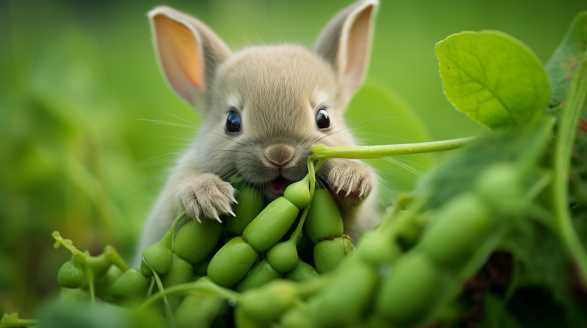
As a proud rabbit owner, I’ve always been conscious of what I feed my furry friends. While rabbits can enjoy a wide variety of fruits and vegetables, it’s crucial to be aware of potential allergies that can affect their health.
These vibrant green legumes are packed with nutrients and flavor but can also pose a threat to rabbits prone to allergies. I will explore the symptoms of snap pea allergies in rabbits and provide some management tips to ensure their well-being.
What are the Symptoms of Snap Pea Allergy in Rabbits?
Identifying allergies in rabbits can be tricky since they can’t communicate their discomfort verbally. However, there are some telltale signs that can indicate a snap pea allergy.
- Digestive Distress: Rabbits suffering from a snap pea allergy may experience digestive issues such as diarrhea, excessive gas, or bloating.
- Skin Irritation: Allergic reactions can manifest as itchiness, redness, hives, or rashes on your rabbit’s skin, particularly around the mouth and paws.
- Respiratory Problems: Some rabbits may show symptoms akin to hay fever or asthma, including sneezing, coughing, wheezing, or difficulty breathing.
- Lethargy: If your rabbit appears unusually tired, lacks energy, or seems less active than usual, it could be a sign of an allergic reaction.
Managing Snap Pea Allergies in Rabbits
While the thought of an allergic reaction in our beloved bunnies may be distressing, there are steps we can take to manage and minimize the onset of symptoms. Here are some effective management tips:
- Avoidance: The simplest and most effective way to prevent allergic reactions is to eliminate snap peas (and any other potential allergens) from your rabbit’s diet altogether. Replace them with other safe foods that provide similar nutritional value, such as leafy greens.
- Monitor Diet: Keep a close eye on your rabbit’s diet and note down any new foods or treats you introduce. Make sure to introduce new items slowly and monitor your rabbit for any adverse reactions.
- Consult a Veterinarian: If you suspect your rabbit has a snap pea allergy, it’s crucial to consult a veterinarian who specializes in rabbit care. They can perform tests and provide specific advice based on your rabbit’s individual needs.
- Natural Remedies: Some holistic remedies, such as herbs or herbal blends, may help alleviate the symptoms of allergies in rabbits. However, it’s essential to consult your veterinarian before administering any natural remedies to ensure they don’t interfere with any prescribed medications or exacerbate the allergy.
- Improve Air Quality: Since rabbits can also experience respiratory symptoms due to allergies, maintaining good air quality is important. Ensure their living environment is well-ventilated, clean, and dust-free.
- Maintain Hygiene: Regularly clean your rabbit’s living areas, including bedding, litter boxes, and toys. This practice helps reduce the presence of allergens and prevents potential allergic reactions.
- Supportive Care: If your rabbit does experience an allergic reaction, provide comfort and support. Ensure they have access to plenty of fresh water, a quiet and stress-free environment, and provide gentle care and attention.
While snap peas may be a delightful addition to our own meals, it’s important to be cautious when sharing them with our furry friends. As rabbit owners, it becomes our responsibility to ensure their well-being and health by monitoring their diet and being aware of potential allergies.
Consult a veterinarian, follow their advice, and provide your bunny with the care and attention they need to overcome any discomfort. With proper management, we can continue to enjoy the company of our fluffy companions while keeping them safe from allergic reactions.
Can Rabbits Have Snap Pea Pods?
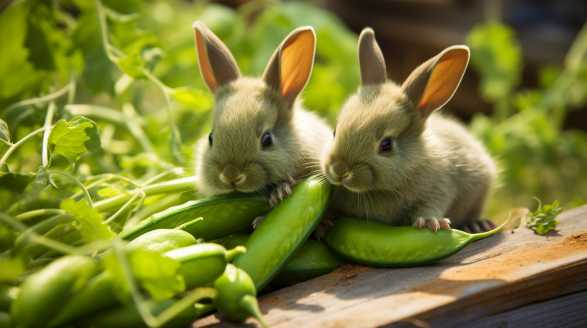
When it comes to keeping our furry friends happy and healthy, it’s essential to pay attention to their diet. As a rabbit owner, you may have wondered if it’s safe to feed your adorable bunny snap pea pods.
So, let’s hop right in!
Are Snap Pea Pods Safe for Rabbits?
As a responsible rabbit owner, you must be cautious about what you offer your fluffy companion to eat. Snap pea pods are a great choice for rabbits for several reasons:
- Nutritional Value: Snap pea pods are packed with essential nutrients. They are an excellent source of vitamins A, C, and K, as well as iron and fiber. These nutrients contribute to the overall well-being of your rabbit.
- Promote Dental Health: Rabbits’ teeth grow continuously, which means they need to constantly chew on fibrous foods to wear them down. Snap pea pods provide a satisfying crunch that helps keep your bunny’s teeth in top shape.
- Hydration: Snap pea pods have a high water content, which helps keep your rabbit hydrated. Adequate hydration is crucial for their overall health and can prevent common problems like urinary tract issues.
How to Safely Feed Snap Pea Pods to Your Rabbit
While snap pea pods are safe for rabbits, there are a few precautions you should take to ensure your furry friend stays healthy:
- Consult Your Vet: Before introducing any new food into your rabbit’s diet, it’s best to consult with a veterinarian. They can provide specific guidance based on your rabbit’s individual needs.
- Introduce Gradually: Start by giving your rabbit a small piece of snap pea pod to gauge their reaction. Observe them closely for any signs of indigestion or allergies. If all goes well, you can gradually increase the amount over time.
- Organic is Best: Whenever possible, choose organic snap pea pods for your rabbit. This ensures that they are free from harmful pesticides or chemicals that could be harmful to your pet.
- Wash Thoroughly: Before offering snap pea pods to your rabbit, give them a good wash to remove any dirt or residue. This helps eliminate the risk of introducing contaminants into your furry friend’s diet.
- Remove Strings and Stems: Snap pea pods have strings and stems that can be a choking hazard for rabbits. Make sure to remove these before feeding them to your bunny.
- Monitor Intake: While snap pea pods are safe, moderation is key. Too much of any new food can upset your rabbit’s delicate digestive system. Keep an eye on their intake and ensure a balanced diet.
Other Vegetables Rabbits Can Enjoy
Snap pea pods are a fantastic addition to your rabbit’s diet, but it’s important to offer a varied selection of vegetables to ensure they receive a well-rounded nutritional intake. Here are some other vegetables that rabbits can enjoy:
- Leafy Greens (e.g., kale, spinach, lettuce)
- Bell Peppers
- Carrots
- Zucchini
- Radishes
- Cucumber
- Broccoli
Remember to introduce new vegetables gradually and observe your rabbit’s reaction each time. This will help you identify any potential allergies or sensitivities.
Vegetables to Avoid Giving Rabbits
While rabbits can enjoy a wide variety of vegetables, some should be strictly avoided, as they can be toxic or cause digestive issues. Here are a few to keep off their menu:
- Potatoes
- Onions
- Rhubarb
- Avocado
- Cabbage
- Tomato Leaves
- Iceberg Lettuce
Make sure to research any new vegetables thoroughly before offering them to your rabbit. Always prioritize their safety and well-being.
Snap pea pods can be a healthy and delicious addition to your rabbit’s diet. With their high nutritional value and dental benefits, they make a great snack for your furry friend.
By following these guidelines, you can keep your rabbit healthy and happy for years to come!
Snap Peas for Baby Bunnies: When and How to Introduce Them
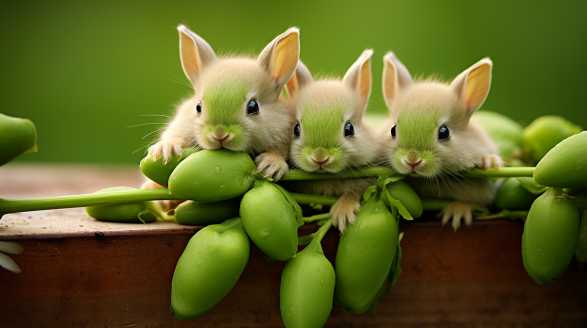
As a proud bunny parent, I always strive to provide the best care for my furry friends. And one question that has often come to my mind is when and how to introduce snap peas to my baby bunnies.
So, join me on this green adventure as we discover the perfect time and method to introduce snap peas to our adorable baby bunnies.
Why Snap Peas are Bunny-Friendly
Before we dive into the specifics, let’s take a moment to appreciate the nutritional benefits of snap peas for our beloved bunnies. These green wonders are a fantastic source of vitamins A, B, and C, as well as fiber, iron, and potassium.
So, let’s hop to it!
When to Introduce Snap Peas
As much as we may be excited to see our baby bunnies munching on snap peas, it’s essential to introduce these treats at the appropriate time. Generally, baby bunnies should be at least 12 weeks old before you start incorporating snap peas into their diet.
The Perfect Method
Now that we’re clear on the ideal age, let’s explore the perfect method to introduce snap peas to our little bundles of joy. Remember, baby bunnies have delicate systems, and sudden dietary changes may upset their tummies.
- Begin by selecting fresh, crisp snap peas. Look for ones that have a vibrant green color and feel firm to the touch. This ensures optimal freshness and crunchiness that your baby bunnies will love.
- Wash the snap peas thoroughly to remove any dirt or pesticides. You can use a gentle vegetable wash, but make sure to rinse them well with clean water afterward. Our furry friends deserve the best!
- After washing, trim both ends of the snap peas, removing any tough or stringy portions. This will make them easier for your baby bunnies to nibble on.
- Now, it’s time to introduce these scrumptious greens to your bunny’s diet. Start by offering a small portion, about the size of your bunny’s paw. Place the snap peas in their feeding bowl or attach them to a bunny-safe chew toy for an exciting challenge.
- Observe your baby bunny’s reaction to the snap peas. Some may take to them immediately, while others may need a little time to warm up to these new treats. Patience is key!
- If your bunny enjoys the snap peas, gradually increase the portion size over time. However, always monitor their intake to ensure they don’t overindulge. Remember, a balanced diet is crucial for their overall health.
Keeping Things Fresh and Fun
To keep the snap pea experience exciting for your baby bunnies, consider incorporating some variations and fun ideas. Here are a few suggestions:
1. Mix and Match
Combine snap peas with other bunny-approved vegetables for a colorful feast. Some great options include carrots, bell peppers, and celery.
2. Frozen Treats
During hot summer months, freeze snap peas for a refreshing treat. Bunnies love nibbling on the cold, crunchy texture.
3. Hide and Seek
Engage your baby bunnies’ natural foraging instincts by hiding snap peas around their play area. This will not only challenge their minds but also provide entertainment and exercise.
Snap peas are an excellent addition to your baby bunny’s diet, providing essential nutrients and a fun snacking experience. Remember, introduce them at the appropriate age and gradually increase portion sizes.
So, go ahead, grab some snap peas, and witness the joy on your baby bunny’s face as they nibble away.
Do Snap Peas Cause Digestive Upsets in Rabbits?
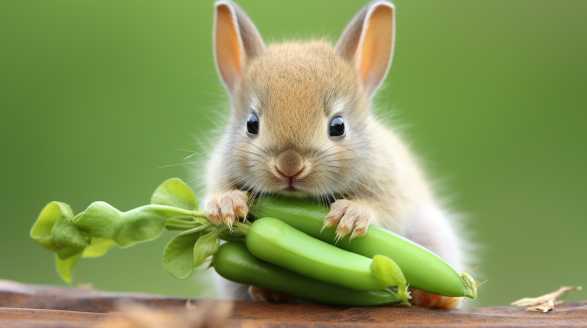
As a rabbit enthusiast, I’ve always wondered about the effects of snap peas on these adorable little creatures. Snap peas are a popular vegetable in many households, and it’s only natural to wonder if they could be a healthy addition to a rabbit’s diet.
Are Snap Peas Safe for Rabbits?
It’s important to note that rabbits have delicate digestive systems and are strict herbivores. While they can eat a variety of vegetables, not all of them are suitable for rabbits due to their sensitive digestive tracts.
Benefits of Snap Peas for Rabbits
- Nutritional Value: Snap peas are rich in essential nutrients that can contribute to a balanced rabbit diet. They are a good source of vitamins A, C, and K, which can promote a healthy immune system and support overall well-being.
- Hydration: Snap peas have a high water content, which can help keep your rabbit hydrated and prevent issues like dehydration or constipation.
- Fiber Content: Rabbits require a high-fiber diet for proper digestion. Snap peas contain a decent amount of dietary fiber, which can aid in maintaining a healthy gastrointestinal system.
- Low Calorie: Snap peas are relatively low in calories compared to other vegetables, making them a healthy and guilt-free snack option for your bunny.
However, despite these benefits, it’s crucial to understand that every rabbit is unique, and some individuals may have sensitivities or allergies to certain foods, including snap peas. Therefore, it’s important to introduce any new food gradually and monitor your rabbit’s reaction closely.
Potential Digestive Upsets
While snap peas are generally safe for rabbits, there are a few potential digestive upsets that you should be aware of:
- Gas Build-Up: Rabbits have sensitive digestion, and certain vegetables can cause gas to accumulate in their intestines, leading to discomfort or bloating. If your rabbit experiences excessive gas after consuming snap peas, it might be best to limit their intake or remove them from their diet entirely.
- Diarrhea: Rapid changes in a rabbit’s diet, particularly introducing large quantities of unfamiliar vegetables, can disrupt their sensitive digestive balance and result in loose stools or diarrhea. If you notice any changes in your rabbit’s droppings after introducing snap peas, reduce or eliminate snap peas from their diet.
- Peeled vs. Unpeeled: Some rabbits may have a preference for the snap pea pods, while others may enjoy the peas inside. Keep in mind that the pods are generally tougher to digest and may cause more significant digestive upsets than the peas themselves. Observe your rabbit’s behavior and adjust accordingly.
- Moderation is Key: Even though snap peas offer several nutritional benefits, rabbits should have a diverse diet that includes a variety of leafy greens, hay, and limited vegetables. Only a small portion of your rabbit’s diet should consist of snap peas, and they should be given as an occasional treat rather than a staple food item.
Introducing Snap Peas to Your Rabbit’s Diet
When introducing any new food to your rabbit’s diet, follow these guidelines to minimize the risk of digestive upsets:
- Gradual Introduction: Start by offering a small piece of snap pea, about the size of your rabbit’s paw, and observe their reaction for the next 24 hours. If there are no adverse effects, slowly increase the portion size.
- Monitor Digestive Health: Keep a close eye on your rabbit’s droppings, looking for any changes in consistency, odor, or frequency. If you notice any issues, consult your veterinarian and consider removing snap peas from their diet temporarily.
- Rotate Vegetables: To maintain a balanced diet, it’s essential to provide your rabbit with a variety of vegetables. Consider switching up their treat options by including other rabbit-safe vegetables, such as carrots, bell peppers, or parsley, to ensure they receive a well-rounded nutritional intake.
- High-Quality Produce: Choose fresh, organic snap peas whenever possible to minimize the risk of chemical contaminants. Wash them thoroughly to remove any pesticides or dirt before offering them to your rabbit.
Snap peas can be a healthy addition to your rabbit’s diet, offering them a range of essential nutrients and hydration. However, due to their sensitive digestive systems, some rabbits may experience digestive upsets when consuming snap peas.
Remember, moderation is key, and a varied diet is ideal for your bunny’s overall health. With proper care and attention, you can safely incorporate snap peas into your rabbit’s treat rotation and provide them with a happy and healthy life.
Snap Peas for Elderly Rabbits: Why They Can Be Beneficial
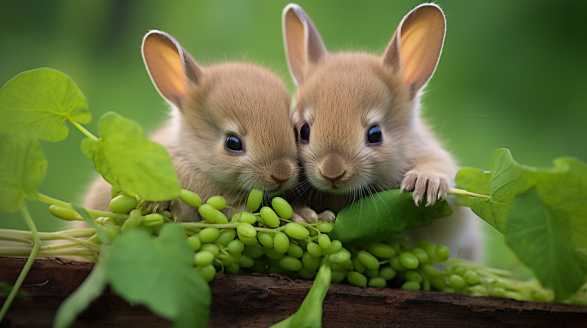
As a proud rabbit owner, nothing brings me more joy than seeing my fluffy friend happy and healthy. That’s why, when my beloved rabbit started reaching its golden years, I wanted to ensure that I was providing it with the best possible care.
I will look into why snap peas can be beneficial for elderly rabbits, and why you should consider incorporating them into your furry friend’s diet.
The Nutritional Powerhouse of Snap Peas
Snap peas are not only delicious but also packed with essential nutrients that can support the health of elderly rabbits. Here are some key nutritional benefits of snap peas:
- Vitamin C: Snap peas are an excellent source of vitamin C, which is essential for maintaining a rabbit’s overall health. Vitamin C helps boost the immune system and can improve the absorption of iron, ensuring that your elderly rabbit stays strong and energetic.
- Fiber: Elderly rabbits may experience digestive issues, such as a sluggish digestive system or constipation. Snap peas are high in fiber, which promotes healthy digestion and helps with regular bowel movements, keeping your rabbit’s digestive system on track.
- Antioxidants: Snap peas are rich in antioxidants that can help combat the effects of aging in rabbits. Antioxidants protect cells from damage caused by free radicals, reducing the risk of age-related diseases and promoting a longer, healthier life for your elderly rabbit.
- Hydration: As rabbits age, they may become more prone to dehydration. Snap peas have a high water content, helping to keep your rabbit well-hydrated and maintain optimal health and energy levels.
How to Incorporate Snap Peas into Your Rabbit’s Diet
Now that we understand the incredible nutritional benefits of snap peas, you may be wondering how to introduce them into your elderly rabbit’s diet. Here are some tips to get you started:
- Gradual Introduction: It’s always important to introduce new foods gradually to avoid upsetting your rabbit’s delicate digestive system. Start by offering a small piece of snap pea and observe your rabbit’s reaction. If they show interest and tolerate it well, you can gradually increase the portion size over time.
- Fresh and Organic: When feeding snap peas to your elderly rabbit, make sure to choose fresh, organic options. Avoid any peas that appear wilted or damaged, as they may not be as nutritious.
- Proper Portion Size: While snap peas are beneficial for elderly rabbits, they should still be given in moderation. Too many snap peas can lead to digestive upset. Aim to offer about one to two snap peas per day as a treat or part of their meal.
- Variety is Key: While snap peas are an excellent addition to your rabbit’s diet, it’s important to remember that a balanced diet should consist of a variety of foods. Include other fresh vegetables, leafy greens, and hay to ensure your rabbit gets a wide range of nutrients.
Signs of Improvement in Elderly Rabbits
As you begin incorporating snap peas into your elderly rabbit’s diet, you may start noticing positive changes. Keep an eye out for the following signs that indicate your rabbit is benefiting from the inclusion of snap peas:
- Increased Energy: If your rabbit starts showing more enthusiasm and energy during playtime, it could be a sign that the snap peas are boosting their overall vitality.
- Healthy Digestion: Regular bowel movements and a well-functioning digestive system are key indicators that your rabbit’s digestive health is improving.
- Shiny Fur: Improved nutrition provided by snap peas can result in a healthier coat for your rabbit. If you notice a shinier and softer fur, it’s a good sign that their overall health is positively affected.
- Alertness and Bright Eyes: A rabbit that feels good on the inside will radiate on the outside. Look for increased alertness and bright, clear eyes as signs that the snap peas are benefiting their overall wellbeing.
Snap peas can provide numerous benefits for your elderly rabbit’s health and vitality. Packed with essential nutrients, antioxidants, and hydration, they can support digestion, immunity, and overall wellbeing.
So why wait? Start incorporating snap peas into your elderly rabbit’s diet today, and watch them flourish in their golden years!
Can Rabbits Eat Snap Pea Leaves?
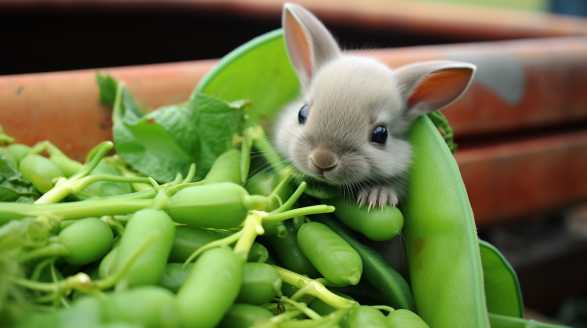
As a proud owner of a cute and furry rabbit, I’m constantly on the lookout for healthy and safe food options for my little friend. Recently, I stumbled upon snap pea leaves and wondered if they were suitable for rabbits to munch on.
So, let’s dive right in and explore whether rabbits can indulge in the deliciousness of snap pea leaves!
Understanding the Rabbits’ Diet
Rabbits are herbivores, which means their primary diet consists of plant-based foods. These adorable creatures love to nibble on various vegetables, fruits, and even leafy greens.
Some plants might even be harmful to rabbits if consumed in large quantities. That’s why it’s crucial to know which foods are safe and healthy for our rabbit companions.
Snap Pea Leaves: Are They Safe for Rabbits?
The Truth Unveiled
Snap pea leaves are indeed safe for rabbits to eat! These leafy greens provide a refreshing and crunchy addition to your rabbit’s diet.
However, it’s important to take some precautions and introduce snap pea leaves responsibly, ensuring they don’t result in any adverse effects.
The Benefits of Feeding Snap Pea Leaves to Your Rabbit
1. Nutritional Powerhouse
Snap pea leaves are brimming with nutritious goodness. They contain vital nutrients like vitamins A, C, and K, which are essential for your rabbit’s overall health.
2. Dental Health
Rabbits’ teeth grow continuously, and they need to chew on fibrous food to prevent dental issues. The crunchy texture of snap pea leaves acts as a natural toothbrush, helping to wear down their teeth and maintain optimum dental health.
3. Hydration Boost
Snap pea leaves have a high water content, which can contribute to hydration for your rabbit. Ensuring your rabbit stays properly hydrated is crucial for preventing urinary tract problems and maintaining overall well-being.
4. Mental Stimulation
Introducing new foods, such as snap pea leaves, provides mental stimulation for your rabbit. Munching on these tasty greens can keep them entertained and prevent boredom.
Tips for Feeding Snap Pea Leaves to Your Rabbit
Now that we have established that snap pea leaves are safe and beneficial for rabbits, it’s important to keep a few things in mind while adding them to their diet.
1. Start Slowly
Introduce snap pea leaves gradually to your rabbit’s diet. Begin by offering a small amount and observe their response.
2. Organic is Best
Whenever possible, opt for organic snap pea leaves to minimize the risk of pesticide residue. This ensures that you’re providing the healthiest option for your beloved pet.
3. Proper Washing
Before feeding snap pea leaves to your rabbit, make sure to wash them thoroughly. This removes any dirt, debris, or potentially harmful substances, guaranteeing a safe and hygienic meal for your furry friend.
4. Moderation is Key
Although snap pea leaves are safe for rabbits, it’s important to remember that they should be consumed in moderation. Too much of any new food can upset your rabbit’s delicate digestive system.
Snap pea leaves can be an exciting and healthy addition to your rabbit’s diet. Packed with essential nutrients, they contribute to their overall well-being and offer a satisfying crunch.
Always prioritize your rabbit’s safety and consult with a veterinarian if you have any concerns or if your rabbit experiences any unexpected reactions to new foods. So, go ahead and treat your rabbit to some snap pea leaves – they’ll surely appreciate the leafy delight!
The Perfect Treat: Homemade Snap Pea Rabbit Treats
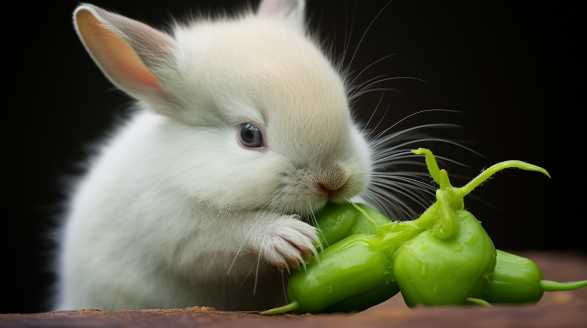
When it comes to pampering our adorable furry companions, nothing can beat the joy of seeing their tails wagging or ears perking up in excitement. As a rabbit owner, I constantly strive to find new ways to bond with my fluffy friend, and one of the most delightful experiences we share is the act of treating them with delicious snacks.
Why Homemade Treats?
Before we dive into the art of making these delectable snap pea rabbit treats, you may wonder why homemade treats are superior to the store-bought ones. Allow me to explain the reasons:
- Controlled Ingredients: By making treats at home, I have the advantage of knowing exactly what goes into my rabbit’s snacks. I can ensure they are free from potentially harmful additives or preservatives.
- Tailored Nutrition: Rabbits have unique dietary needs, and homemade treats enable me to customize their nutrition, catering to their specific requirements.
- A Bonding Opportunity: Preparing treats at home is not only an adventure for me but also an opportunity for my bunny and me to bond over a shared experience. I love watching their excitement as they anticipate their homemade delicacy.
Ingredients for Homemade Snap Pea Rabbit Treats:
Now, let’s gather the necessary ingredients to create these scrumptious snap pea rabbit treats:
- 1 cup of fresh snap peas
- 1 small carrot
- 1 cup of hay pellets (plain, without any additional ingredients)
- ¼ cup of rolled oats
- 1 tablespoon of rabbit-safe herbs (e.g., parsley or cilantro)
- Water (for steaming)
The Process: From Snap Peas to Rabbit Delight
I must admit, making these snap pea rabbit treats is a breeze. Just following a few simple steps, you can create a lip-smacking snack your bunny will adore.
- Steam the Snap Peas: Begin by steaming the snap peas until they are soft and tender. This helps in preserving their nutrients and enhancing their taste. Allow them to cool before proceeding to the next step.
- Grate the Carrot: Take the small carrot and grate it finely. This will add a lovely crunch and a subtle sweetness to the treats, making them irresistible for your rabbit.
- Crush the Hay Pellets: Next, crush the hay pellets into a coarse powder. This can be easily accomplished by using a mortar and pestle or a food processor. The hay pellets are an essential ingredient as they provide the necessary fiber for your bunny’s digestive health.
- Blend the Ingredients: Combine the steamed snap peas, grated carrot, crushed hay pellets, rolled oats, and the rabbit-safe herbs into a blender or food processor. Blend them until you achieve a thick and homogenous mixture.
- Forming the Treats: Once your mixture is ready, take small portions of it and roll them into bite-sized balls or any other shape your bunny prefers. Place them on a tray lined with parchment paper for easy removal later.
- Cooling Time: Allow the treats to cool and set for at least an hour. During this time, they will firm up and become more enjoyable for your rabbit. Patience is key here!
- Serve with Love: Finally, it’s time to pamper your furry companion! Present them with these homemade snap pea rabbit treats and watch their eyes light up with delight. Remember to serve them in moderation to maintain a balanced diet.
Creating homemade snap pea rabbit treats is a rewarding experience for both you and your beloved bunny. By taking the time to prepare these wholesome and delicious snacks, you not only ensure their optimal nutrition but also strengthen the bond between you and your fluffy friend.
Give this recipe a try and witness the joy that spreads across your rabbit’s face as they relish their perfect homemade treat!
A Comprehensive Guide: Safe Vegetables for Rabbits Including Snap Peas
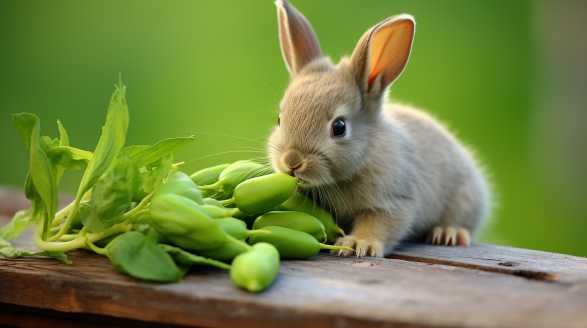
Hey there, fellow rabbit enthusiasts! If you’re like me, you want to ensure your furry little friends have a well-balanced and healthy diet.
I will share with you everything I know about safe vegetables for rabbits, with a special focus on everyone’s favorite – snap peas!
Why Is a Balanced Diet Important for Rabbits?
Before diving into the world of safe vegetables for rabbits, it’s important to understand why a balanced diet is vital for our furry pals. Rabbits, being herbivores, have specific dietary needs that differ from dogs or cats.
A well-balanced diet helps prevent health issues like obesity, malnutrition, and gastrointestinal problems. It also keeps their teeth healthy and provides essential nutrients such as fiber, vitamins, and minerals.
Safe Vegetables for Rabbits
Without further ado, let’s explore a list of safe vegetables that you can freely include in your rabbit’s diet:
- Bok Choy: This leafy green vegetable is low in calories and packed with nutrients like vitamins A, C, and K. It’s also an excellent source of fiber.
- Celery: Another fantastic option for your bunny, celery is a crunchy treat that provides vitamins A, C, and K, while also satisfying their need to chew.
- Cucumber: Rabbits love the refreshing crunch of cucumber, and it’s packed with hydrating properties, vitamins, and minerals.
- Kale: A nutritious leafy green veggie, kale is packed with vitamins A, C, and K. However, feed it sparingly due to its calcium content.
- Carrots: Ah, the classic carrot! These vibrant orange veggies are a rabbit’s delight, loaded with vitamin A and a satisfying crunch.
Exploring the Amazing World of Snap Peas for Rabbits
Now, let’s zoom in on snap peas, great-tasting legumes that make a delightful addition to your furry friend’s vegetable repertoire. Snap peas, also known as sugar snap peas, are safe and healthy for rabbits when offered in moderation.
Nutritional Benefits of Snap Peas for Rabbits
Snap peas are not only delicious, but they also provide essential nutrients to keep your bunny hopping with happiness. Here are the nutritional benefits of snap peas:
- Fiber: Snap peas are an excellent source of dietary fiber, which aids in digestion and helps keep your rabbit’s gastrointestinal tract healthy.
- Vitamin C: These peas are bursting with vitamin C, boosting your bunny’s immune system and promoting overall health.
- Antioxidants: Snap peas contain antioxidants that fight the damaging effects of free radicals in your rabbit’s body.
Properly Introducing Snap Peas to Your Rabbit
Now that we know all about the nutritional goodness of snap peas, it’s time to introduce this exciting vegetable to your bun!
Remember, rabbits have delicate digestive systems, so it’s important to introduce new foods gradually. Here’s a simple step-by-step guide:
- Start small: Begin by offering a small piece of snap pea as a treat, observing your rabbit’s reaction.
- Monitor digestion: Keep an eye on your rabbit’s stool to ensure their digestive system is not adversely affected.
- Gradually increase portions: If everything goes well, gradually increase the amount of snap peas over several days to avoid any digestive upsets.
Safety Tips When Offering Vegetables to Rabbits
While offering delicious vegetables like snap peas, it’s essential to follow some safety tips to ensure your rabbit’s well-being:
- Wash thoroughly: Always wash vegetables before feeding them to your bunny to remove any harmful pesticides or dirt.
- Remove seeds: Remove any seeds or pits from the vegetables as some may be toxic to rabbits.
- Moderation is key: Variety is excellent, but make sure not to overload your rabbit’s diet with too many vegetables at once. Restrain from exceeding 15-20% of their daily food intake.
There you have it, my fellow rabbit enthusiasts – a comprehensive guide to safe vegetables for rabbits, with a special nod to the delicious snap peas! Remember, a balanced diet is crucial for your furry friends, so ensure they have a variety of safe vegetables to munch on.
Keep exploring the amazing world of rabbit-friendly veggies and watch your fluffy friends thrive!
Snap Peas vs. Snow Peas: Which is Safer for Rabbits?
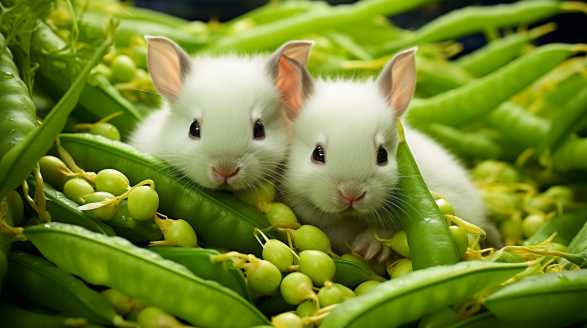
As a rabbit owner, one of the most important aspects of my furry friend’s diet is ensuring their safety when it comes to the food they consume. Rabbits are known to be curious creatures, and while their diet mainly consists of hay and leafy greens, it’s always good to provide them with some variety.
But which one is safer for rabbits? Let’s dive into the world of peas and find out!
Snap Peas: A Burst of Crunchiness!
When I first introduced snap peas to my rabbit’s diet, I was immediately captivated by their vibrant green color and satisfying crunch. Snap peas, also known as sugar snap peas, are plump and juicy.
Here are some key points to consider about snap peas:
- Nutritional Value:
- Snap peas are rich in essential nutrients like vitamin K, vitamin C, and fiber.
- These peas also provide a good amount of manganese, a mineral vital for the proper functioning of a rabbit’s body.
- Safe Consumption:
- The tender pods of snap peas are safe for rabbits to munch on.
- They can be given both as a snack and as part of a balanced diet.
- Moderation is Key:
- While snap peas are safe for rabbits to eat, they should be given in moderation.
- An excessive amount of snap peas can lead to digestive upset due to their high sugar content.
Snow Peas: Crispy and Refreshing!
Snow peas, also known as Chinese pea pods, have a unique texture and flavor that adds a refreshing element to any dish. These pea pods are flatter than snap peas and contain small, underdeveloped peas inside.
- Nutritional Value:
- Snow peas are packed with vitamins A, C, and K, as well as minerals like iron and magnesium.
- These peas are low in calories, making them suitable for rabbits on a weight management diet.
- Safe Consumption:
- Snow peas are safe for rabbits to eat, both the pod and the tiny peas inside.
- They can be an excellent option for rabbits who enjoy the crisp texture of the pods.
- Mind the Quantity:
- As with any treat, snow peas should be given in moderation.
- Overfeeding snow peas can lead to gas or bloating in rabbits due to their high water content.
The Common Ground: What both Peas Offer
While snap peas and snow peas have their distinctions, there are a few key similarities that make them suitable choices for rabbit owners:
- Fiber-Rich Snacks:
- Both snap peas and snow peas are rich in fiber, which can aid digestion in rabbits.
- Fiber plays a crucial role in maintaining a healthy gut and preventing gastrointestinal issues.
- Hydration Boosters:
- Both types of peas contain a high water content, contributing to proper hydration in rabbits.
- A hydrated rabbit is a happy rabbit, as it helps prevent urinary tract issues and supports overall well-being.
- Teeth-Friendly Munchies:
- Peas, whether snap or snow, provide a satisfying crunch that helps wear down a rabbit’s continuously growing teeth.
- Chewing on pea pods can be an engaging activity for rabbits, promoting dental health and reducing boredom.
To Snap or Not to Snap? It’s All About the Balance!
While both snap peas and snow peas can be a delightful addition to a rabbit’s diet, it’s crucial to maintain a balance and include other essential food groups. Remember these key recommendations:
- Variety is Key:
- Peas should only be part of a diverse diet that primarily consists of hay and dark leafy greens.
- Offering a wide range of vegetables ensures your rabbit receives all the necessary nutrients.
- Opt for Organic:
- When possible, choose organically grown peas.
- Organic peas are free from harmful pesticides, making them a safer choice for your rabbit.
- Introduce Gradually:
- When introducing peas to your rabbit’s diet, do so gradually to prevent digestive upsets.
- Start with small portions and observe your rabbit’s reaction before increasing the quantity.
Both snap peas and snow peas can be enjoyed by rabbits, bringing a burst of flavor and texture to their diet. However, it’s essential to remember that moderation is key.
With a well-balanced diet that includes peas, hay, and leafy greens, your furry friend will hop into a world of deliciousness and optimal health!
So, grab a handful of peas, open your rabbit’s hutch, and watch them nibble away at these delightful treats. Happy snacking, rabbit enthusiasts!
Stay tuned for more tantalizing tales of rabbit nutrition and safe food choices.
Conclusion
Wow, what a journey we’ve been on! From exploring the benefits of snap peas for rabbits, to understanding which vegetables are safe for our furry friends, we’ve covered it all.
These little green wonders have truly become a treasure in my bunny’s diet.
But the fun doesn’t stop here! Armed with our newfound knowledge, we can continue to treat our bunnies to a world of safe and exciting vegetables.
Providing a diverse range of vegetables, while still prioritizing hay and leafy greens, ensures that our rabbits receive a well-rounded and nutritious diet.
As rabbit owners, we know that our fluffy companions bring us endless joy and unconditional love. So, it is our responsibility to give them the best care possible, including a diet that supports their health and well-being.
So, let’s embark on this journey together, armed with the knowledge and passion to provide our rabbits with a diet that will keep them hopping with happiness. Keep exploring, experimenting, and bonding with your furry friends over delicious and safe treats.
Remember, the world of rabbit nutrition is vast and ever-evolving. Stay curious, stay informed, and continue to educate yourself about the best ways to care for your bunny.
So go on, grab some snap peas, gather your bunny in your arms, and savor the joy of knowing that you are nourishing and loving your rabbit to the moon and back. Here’s to many more delightful culinary adventures with our furry companions!
Frequently Asked Questions
Can rabbits eat snap peas?
- Q: Are snap peas safe for rabbits to eat?
A: Yes, snap peas are safe for rabbits to eat in moderation. They can be a healthy and tasty treat for your furry friend.
- Q: How should I introduce snap peas into my rabbit’s diet?
A: When introducing snap peas to your rabbit’s diet, start by offering a small amount and observe how they react. Gradually increase the portion size if they show no negative reactions.
- Q: Can snap peas be a part of a rabbit’s regular diet?
A: While snap peas can be part of a rabbit’s diet, they should not make up the majority of their daily food intake. It is essential to offer a varied diet with hay, fresh vegetables, and a limited amount of pellets.
- Q: How often can I feed snap peas to my rabbit?
A: Snap peas should be offered as an occasional treat, rather than a daily staple. Feeding them once or twice a week is generally recommended to ensure a well-balanced diet for your rabbit.
- Q: Are there any risks associated with feeding snap peas to rabbits?
A: Snap peas are generally safe for rabbits, but they can cause digestion issues if eaten in excess. It’s essential to introduce any new food gradually to monitor your rabbit’s reaction and prevent digestive problems.
- Q: Should I remove any parts of the snap pea before feeding it to my rabbit?
A: It is recommended to remove the tough strings or fibers that run along the snap pea pod to make it easier for the rabbit to eat. This can help prevent any choking hazards or digestion issues.
- Q: Can rabbits eat both the snap pea pod and peas inside?
A: Yes, rabbits can eat both the snap pea pods and the peas inside. The entire pod is safe for them to consume and provides additional fiber and nutrients.
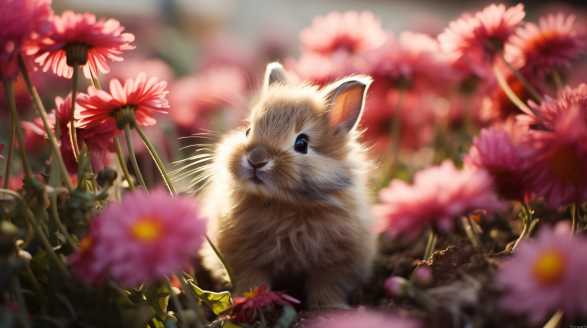
Do Rabbits Eat Dahlias
Introduction Do Rabbits Eat Dahlias? It turns out that dahlias may not be such a friendly feast for our adorable hopping companions. Now, picture this: you’ve painstakingly nurtured your dahlia garden, carefully selecting the most stunning varieties, and imagining a wonderland of color and beauty. But wait! A heart-wrenching sight, isn’t it? But fear not, […]
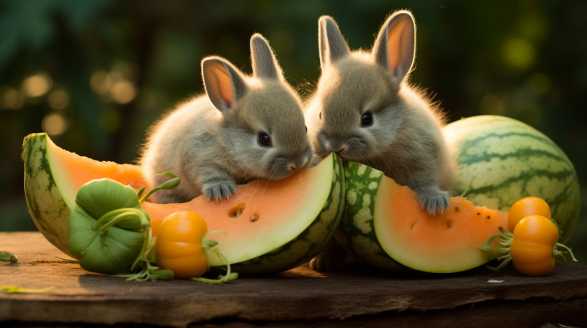
Can Rabbits Eat Honeydew
Introduction Hey there, fellow rabbit aficionados! Are you ready for a hop-tastic journey into the wonderful world of honeydew and its impact on our fluffy friends? Picture this – a warm, sunny day, a happy bunny bounding through the grass, and you, standing there, armed with a juicy slice of honeydew melon. As you reach […]
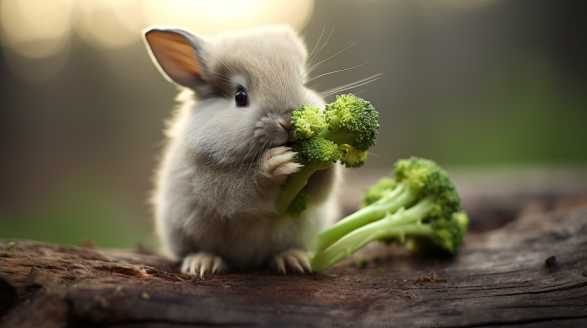
Can Rabbits Eat Broccoli
Introduction Can rabbits eat broccoli? Let’s find out. Picture this: a field of green, where rabbits roam freely, munching on deliciously crisp and nutrient-packed broccoli. Sounds like a dream, right? Broccoli is not only a human superfood but also a superfood for rabbits. It’s like nature’s little gift to our furry friends, packed with essential […]
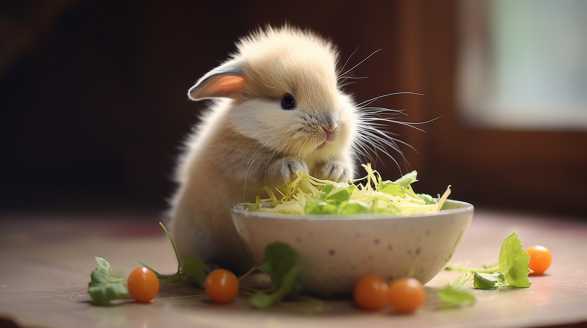
Can Rabbits Eat Bean Sprouts
Introduction Hey there, fellow rabbit lovers! If you’re a proud rabbit owner like me, you know how important it is to take care of your fluffy little friend. That’s why I’m so excited to dive into the topic of bean sprouts and their potential allergenic effects on rabbits. Bean sprouts, those crunchy and nutritious little […]
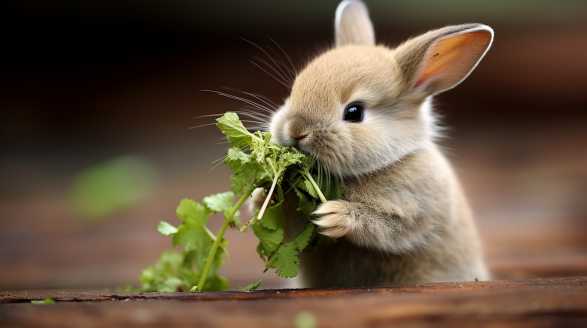
Can Rabbits Eat Catnip
Introduction Can rabbits eat catnip? Can you imagine the hilarity and chaos that would ensue? Well, get ready, my friends, because that’s exactly what we’re about to explore in this article! You see, I’ve always been fascinated by the mesmerizing effects of catnip on our feline friends. The way cats roll around, purr, and jump […]
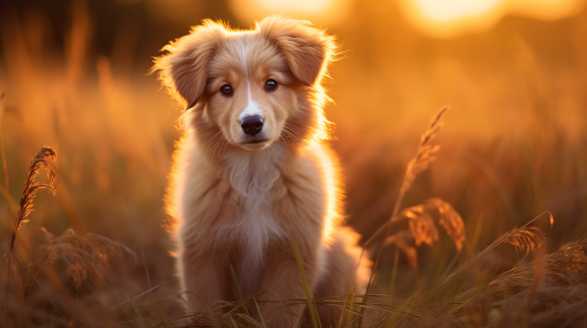
Do Rabbits Eat Dog Poop
Introduction If you’re a proud rabbit owner like me, you probably have a laundry list of questions about your furry friend’s peculiar habits. One question that has always stuck with me is why some rabbits have a tendency to eat dog poop. But the more I’ve researched this topic, the more fascinated I’ve become. I’ve […]
